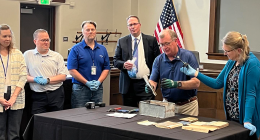
The NHS will grind to a halt on 20 December under plans being discussed for a coordinated Christmas strike in England and Wales by nurses, ambulance drivers and hospital staff.
The unprecedented day of industrial action would leave NHS bosses struggling to keep even the most basic services running to standards that patients would expect, with many reduced to “Christmas Day” levels of staffing.
Intensive talks are understood to have taken place between union representatives and the government about how to “avoid loss of life”.
Pay offers substantially lower than the rate of inflation at a time of a cost of living crisis and dangerously low staffing levels in some areas are part of the rationale for industrial action, unions say.
Downing Street has urged them to consider the impact on patients before pressing ahead.
The prime minister’s spokesperson said: “We are concerned about the impact strikes by multiple unions will have on the people of this country as we head into the Christmas period.
“We recognise that these are challenging economic times but public sector pay awards must be affordable for the taxpayer.”
Three unions – GMB, Unite and Unison – have announced support for strikes but are yet to make public the dates. It is understood that talks are ongoing between the three unions over a coordinated effort.
One source said they had expected an announcement as early as Friday about a strike date from GMB and Unite, but it is understood negotiations are yet to be finalised.
Discussions were continuing deep into Thursday but it is also understood that there is growing consensus that striking on 20 December would create maximum impact by joining ambulance workers with more than 100,000 nurses when they strike five days before Christmas. Unison is not expected to announce their plans until next week.
Health unions have an obligation to maintain “life-preserving care” but officials said ambulance service staffing levels, in particular, were already below a level normally regarded as a minimum for patient safety.
Rachel Harrison, national officer at the GMB, said: “Vacancies in ambulance trusts across England and Wales are high and demand is though the roof – the headcount is far below what would typically be mandated as a safe staffing level for industrial action.
“This means, perversely, we would have to encourage members to work more during industrial action to meet what we believe to be safe staffing levels.”
One senior NHS official warned that disruption to already heavily overstretched ambulance services would make it impossible to reach patients after 999 calls within current response times.
The source said the ambulance worker strike would present “the biggest challenge. That’s the one we’re most concerned about.”
“That’s mainly because of how much pressure they are under and how they could reasonably be expected to maintain a high level service with so many paramedics off,” the source added. “They can contingency plan, of course, and there’s a chance the army could come in to support. But it’s not like other services where, to an extent, you can ration services, for example by not doing elective work to put more staff into emergency care [in hospitals].”
Dr Adrian Boyle, president of the Royal College of Emergency Medicine, told BBC Radio 4’s Today programme that more than 200 people who died last week in England are estimated to have been affected by problems with urgent and emergency care.
Figures released on Thursday showed that one in three patients arriving at hospitals in England by ambulance last week waited at least 30 minutes to be handed over to A&E teams.
The figure is higher than at any point in the past five winters and up 5% on the previous week. More than 11,000 patients – 15% of the total – waited more than an hour.
Prof Stephen Powis, NHS national medical director, said the service was facing the “most challenging winter yet”.
“These new figures show the NHS is facing a perfect storm, with winter virus cases rapidly increasing alongside ongoing pressures in emergency care and hugely constrained bed capacity,” he said.
Britain is facing rolling strikes across the public services in the run up to Christmas including by rail workers, teachers, security guards handling cash and driving examiners.
The Public and Commercial Services union (PCS), representing civil servants including Border Force officers, Passport Office staff and National Highways employees, has also backed strike action but is yet to confirm dates. The Fire Brigades Union is also planning to ballot its members after rejecting a 5% pay rise.
GMB, Unite and Unison members voted in favour of a strike in ambulance trusts across England and Wales earlier this week as they rejected the government’s offer of a 4% pay award, described as another “massive real-terms pay cut”.
RCN members plan to strike on 15 and 20 December and on further unspecified dates in January as they seek to secure a 5% above-inflation pay rise, a request described as “not affordable” by the health secretary, Steve Barclay.
Nurses will strike at 53 NHS organisations in England, including major acute hospitals in cities across the country along with 12 of the 13 health boards and other NHS bodies in Wales and all 11 in Northern Ireland.
Rachel Power, chief executive of the Patients Association, called on the government to go back to the negotiating table.
She said: “Our concern is always focused on patients. We believe patients should have access to safe and effective care when they need it.
“But we do respect the right of any employee to consider industrial action and know for many employees, going on strike is very much the last option when all other ways of resolving differences have broken down. We also know how hard the last few years have been on people working in the health and social care system. Many of them are demoralised and many are leaving the service.”
She added: “At a time when hospitals are struggling to cope, the cancellation of operations and appointments because of industrial action will increase pressures across NHS services, which are already stretched to breaking point.
“In fact, industrial action by any group of employees can put the normal running of patient services at risk, which is why we’d like the government to talk to the unions to find a solution that would prevent any strike.”
Read More: World News | Entertainment News | Celeb News
Guardian






